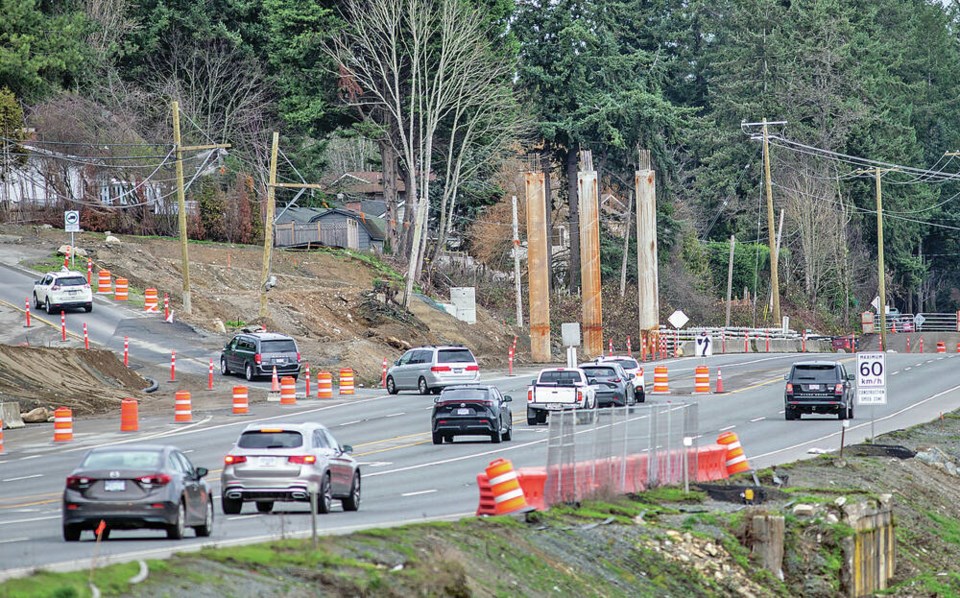A commentary by a retired business leader who lives in Victoria.
Not so long ago, a $10-million government infrastructure project was regarded as a significant expenditure. But now $10 million doesn’t come close to funding projects as simple as a fire hall or new police station.
Here in the Victoria region, a new fire hall in the District of Saanich originally budgeted at $27 million has jumped to $45 million. In Langford, the estimated cost of a new RCMP building is an incomprehensible $82 million. Just north of Victoria, the cost of what was to be a simple flyover eliminating a dangerous left turn across the busy Patricia Bay Highway has spiked from its original estimate of $44 million to $77 million.
These cost increases seem big to us here on Fantasy Island, but they are a rounding error in mega-city Toronto. The Ontario Line, a 15.6-kilometre transit line connecting the Science Centre to Ontario Place, was budgeted at $10.9 billion when first announced in 2019. A series of updates has seen the cost balloon to an estimated $19 billion, an increase of more than 70 per cent.
These are just a few examples of municipal and provincial cost overruns. No doubt the total of overruns for all projects is immensely higher. Who is the project mismanagement grand champion? You’re not likely to be surprised.
Statistics Canada data for 2021, the latest available, show that federal capital infrastructure project expenditures totalled $108 billion. Given that Ottawa bureaucrats are famous for mismanagement of virtually every project (e.g., the ArriveCAN app) does anyone doubt that many of those billions went to overruns resulting from a combination of sloppy design specifications and project mismanagement? And now the Trudeau government has added costly “social justice” obligations to its projects, including gender diversity, participation by ethnic minorities and disabled people, as well as other elements of woke ideology.
Consider “The Great Helicopter Hangar Saga,” a story I have from sources I know to be completely reliable.
For many years, the Pacific Maritime Helicopter Squadron hangar had been located adjacent to the Victoria Airport. In 2004, the Department of National Defence announced the awarding of a $1.8-billion contract for 28 Sikorsky CH148 Cyclone helicopters.
A new hangar was required. DND engineers designed one that would meet their needs at an estimated cost of roughly $18 million. Then they handed the project to Public Works and Government Services Canada. That’s when the project entered an eerie part of the space-time continuum resembling the old science fiction TV series The Twilight Zone. Public Works decided the hangar needed to “sustain operations” in the event of a magnitude-8.0 earthquake, an incomprehensible decision for several reasons.
First, that’s seven times stronger than the most severe earthquake ever recorded on Vancouver Island. Second, severity of earthquake damage depends on the subsurface. Buildings sitting on a soil and gravel subsurface suffer much more damage than those resting on bedrock because the soft material changes from behaving like a solid to behaving like a thick liquid, further amplifying the shaking. But the hangar location was solid bedrock.
But the Public Works technocrats were oblivious to those facts. Steel piles were driven into the bedrock at a cost of $8 million and a two-year delay. Cross-bracing of the interior wall openings added more millions.
When actual construction finally began, government bureaucrats specified more office space, locker and “administrative security” facilities than the DND had considered necessary, adding more costs.
Then came the woke costs. In determining the contract award, Public Works required First Nations involvement both as subcontractors and in the workforce, extensive gender diversity and complete disabled access. The elevator had to have braille and voice recognition along with full wheelchair accessibility. Members of the military joked that it must be for the “blind and disabled pilots.”
By the time the new hangar was handed back to the military, the cost of the DND’s $18-million hangar had skyrocketed to a staggering $155 million.
In July 2019, Philip Cross published an insightful column in FP Comment entitled “Why governments keep screwing up major infrastructure projects.” He wrote: “Prominent studies of domestic and international public infrastructure projects found cost overruns averaged between 45 and 86 per cent.” How come? “Public projects suffer from a lack of accountability. Governments evaluate projects not according to the performance-based criteria of the private sector, but by their conformity to rules and processes.”
This evidence of dysfunctional project mismanagement comes at a time when public infrastructure spending is at record levels, dominated by the federal government’s $33-billion 2023-24 infrastructure project budget. It’s sure to be made even more dysfunctional and costly by the Liberals’ implementation of woke ideology.
When will Canadians wake up and finally dismiss a government that defies the values of honesty and openness our country was built on?
>>> To comment on this article, write a letter to the editor: [email protected]



